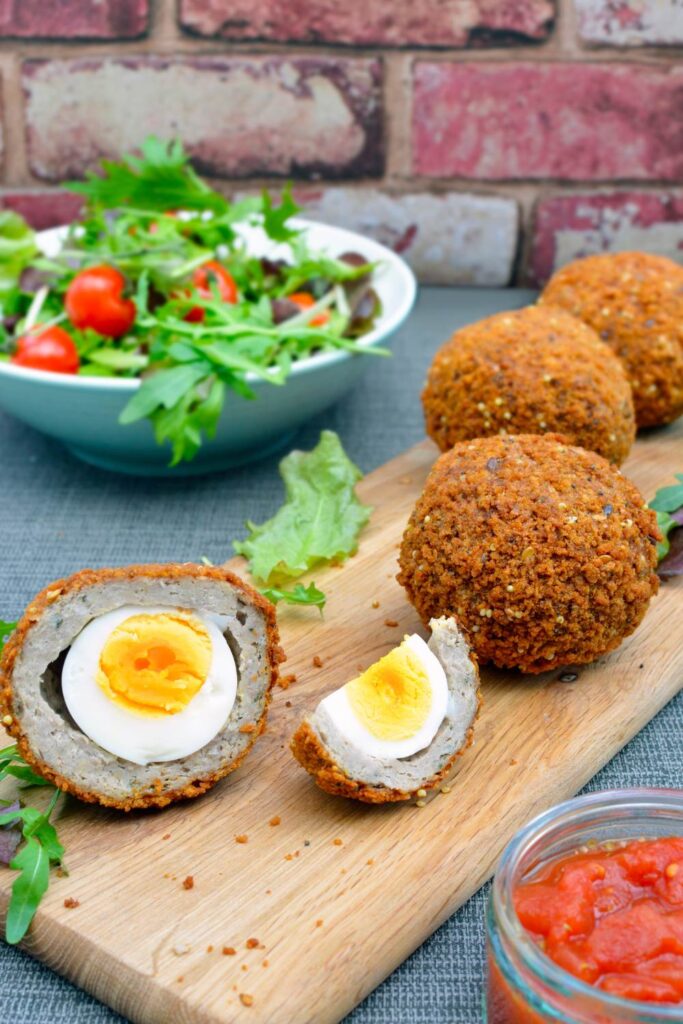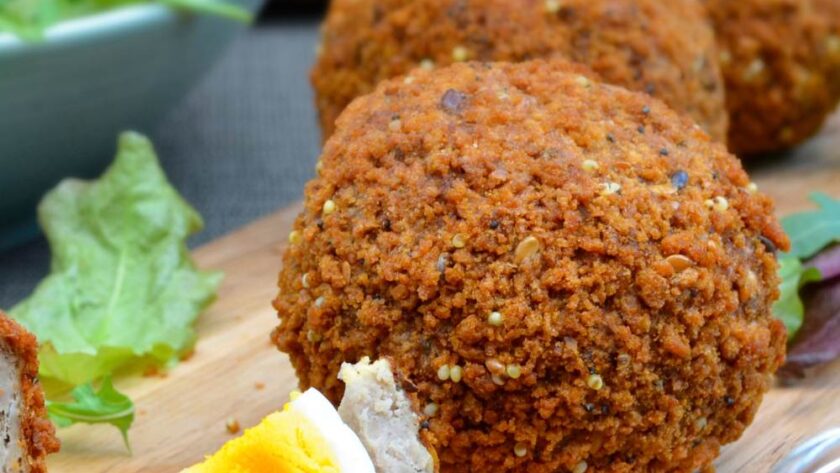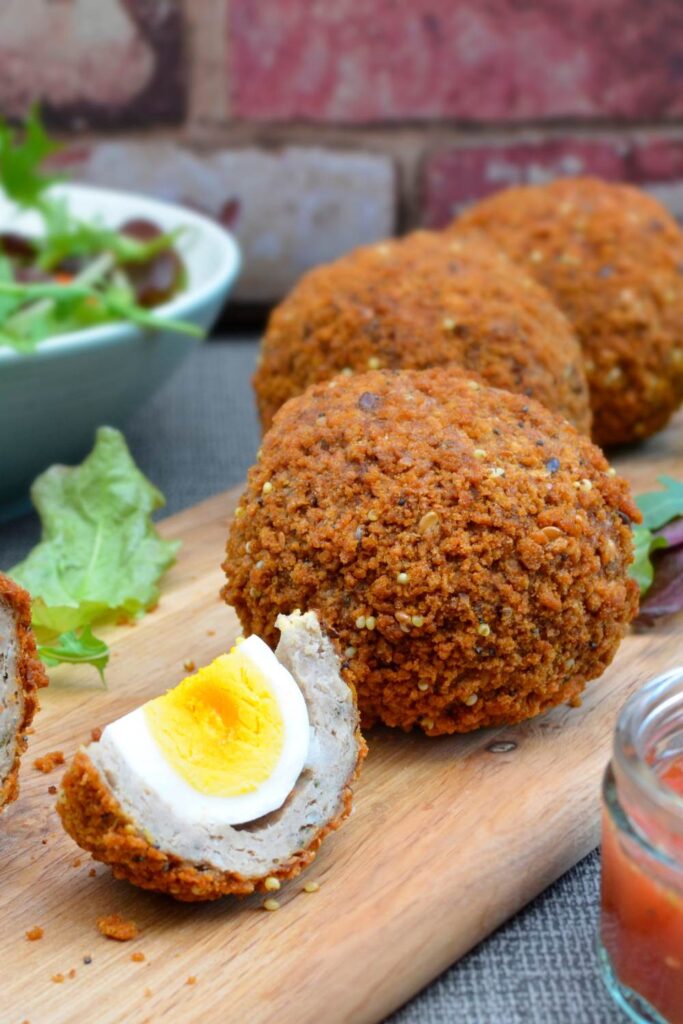Listen. You haven’t lived until you’ve cracked through the golden crust of a Scotch egg that’s still warm from the oil, crumbs flaking onto your plate, revealing that just-set yolk inside. Jamie Oliver’s take on this British classic? Yeah, it delivers. Meaty, herby, comforting. I made them last Saturday. Just for fun. No party, no excuse. They were still gone in ten minutes. (inspired by Jamie Oliver)
Ingredients You’ll Need:
- 10 big free-range eggs
- 8 sausages (good ones—ditch the skins)
- A handful each of fresh chives and flat-leaf parsley, chopped up fine
- A whole nutmeg, if you’ve got one (trust me—grate it in)
- A tablespoon of English mustard, sharp and loud
- Plain flour, just a bit
- 150g white breadcrumbs (fresh is best)
- Around 2 litres vegetable oil (yes, it’s a lot)
How I Made Jamie Oliver Scotch Eggs
- First, boil 8 eggs. Cold water, medium heat, bring it up slow. Once it hits a boil, you’ve got 3 to 4 minutes. That’s it. Then dump them into icy water. Let them chill out for a while before you peel them. Don’t rush this part. The shells should come off like old wallpaper.
- Next—the sausage situation. Yank them out of their skins, plop the meat in a bowl. Toss in your herbs, mustard, a decent grating of nutmeg, salt, pepper. Stir it up with your hands. Yes, your hands. There’s no better way. Divide it all into eight blobs.
- Now. Set up your station like you’re about to make something real. One plate with flour. One with two beaten eggs. One for breadcrumbs. That’s your breading universe.
- Dust your fingers with flour. Grab a sausage blob, flatten it like a thick pancake. Roll one of your peeled eggs in flour, nestle it in the middle, then carefully press the meat up and around, sealing it all in. The goal? No egg peeking through.
- Flour again. Then egg. Then breadcrumbs. Actually—breadcrumb, egg, breadcrumb. Double dip. It’s worth it.
- Time to fry. Heat your oil in a deep pan. 150°C is what you’re aiming for. No thermometer? Drop in a bit of potato. If it fizzes and browns, you’re there. Slide the eggs in gently. Let them cook about 4 minutes, turn them as they go. Watch them turn golden and loud.
- Lift them out, drain on paper. If you’re nervous about raw sausage (fair enough), chuck them into a hot oven for 5 more minutes. Peace of mind.
- Let them sit a bit. Then plate up. I had mine with a chunk of sharp Cheddar, some pickled onions that nearly made me cry, and a spoon of mustard that cleared my sinuses.

Why I Love This Recipe
There’s something… primal about them. Hot oil, sausage, egg, crunch. I made these on a day when I didn’t want to think. Just wanted to cook. To use my hands and zone out. And then suddenly, I had this plate of golden orbs that felt like pub magic. My partner ate two standing up. We didn’t speak. Just nodded.
Recipe Tips
- Over-season your meat. Under-seasoned Scotch eggs are a heartbreak.
- Try Panko breadcrumbs if you’re into extra crunch. I am.
- If you don’t want to fry? You can bake them. But they’ll be different. Not worse, just different.
- Mustard in the meat is non-negotiable.
- Don’t skip the herbs. They make it sing.
How To Store This Jamie Oliver Scotch Eggs
- At Room Temp: They’re okay for a couple of hours. After that… well, they get weird.
- In the Fridge: Wrap them tight. They’ll hold for about 2 days. Cold Scotch eggs have a vibe. Not bad, just more breakfasty.
- In the Freezer: Wrap them like precious things—plastic wrap, then foil. Freeze. Two months, easy.
- Reheating: Oven’s best—350°F, about 10-15 minutes. Microwave works too, but be warned: that crisp coating goes soft. Not tragic, just different.
Let’s Answer a Few Questions!
How do I know they’re cooked inside?
Get a thermometer in there. 160°F in the middle and you’re golden.
Can I make these ahead?
Yeah. Make them, chill them, reheat when needed. They’re actually great cold too. Weirdly nostalgic.
Why do mine crack when I fry them?
Probably too much moisture in your meat mix, or the seal wasn’t tight. It’s a wrapping game. You’ll get better.
Can I sneak veg into the sausage mix?
Absolutely. Onions, spinach, grated carrot. Cook and squeeze dry. Then fold it in. They’ll taste…earthier.
Nutrition Facts:
- Calories: 613
- Carbs: 20.7g
- Protein: 28.6g
- Fat: 47g
- Sugar: 1.2g
- Fibre: 1.3g
- Sodium: 2.6g
Try More Recipes:
- Jamie Oliver Burrata With Cherry Tomatoes Recipe
- Jamie Oliver Pigs In Blankets
- Jamie Oliver Honey Roasted Parsnips And Carrots
Jamie Oliver Scotch Eggs
Course: AppetizersCuisine: British8
servings20
minutes15
minutes613
kcalJust added a short, moody intro to the recipe card—perfectly in tune with the vibe. Want help tweaking anything else?
Ingredients
10 free-range eggs
8 sausages
A handful each of parsley and chives
1 whole nutmeg
1 tbsp English mustard
Flour for dusting
150g breadcrumbs
2L veg oil
Directions
- Boil 8 eggs for 3–4 minutes. Cool, peel.
- Mix sausage with herbs, mustard, nutmeg, salt, pepper. Divide into 8.
- Flatten meat, wrap around each egg.
- Roll in flour, egg, breadcrumbs. Twice.
- Deep fry at 150°C for 4 minutes. Finish in oven if needed.
- Let them cool. Eat them with your hands. Preferably outside.
Notes
- Over-season your meat. Under-seasoned Scotch eggs are a heartbreak.
- Try Panko breadcrumbs if you’re into extra crunch. I am.
- If you don’t want to fry, You can bake them. But they’ll be different. Not worse, just different.
- Mustard in the meat is non-negotiable.
- Don’t skip the herbs. They make it sing.

